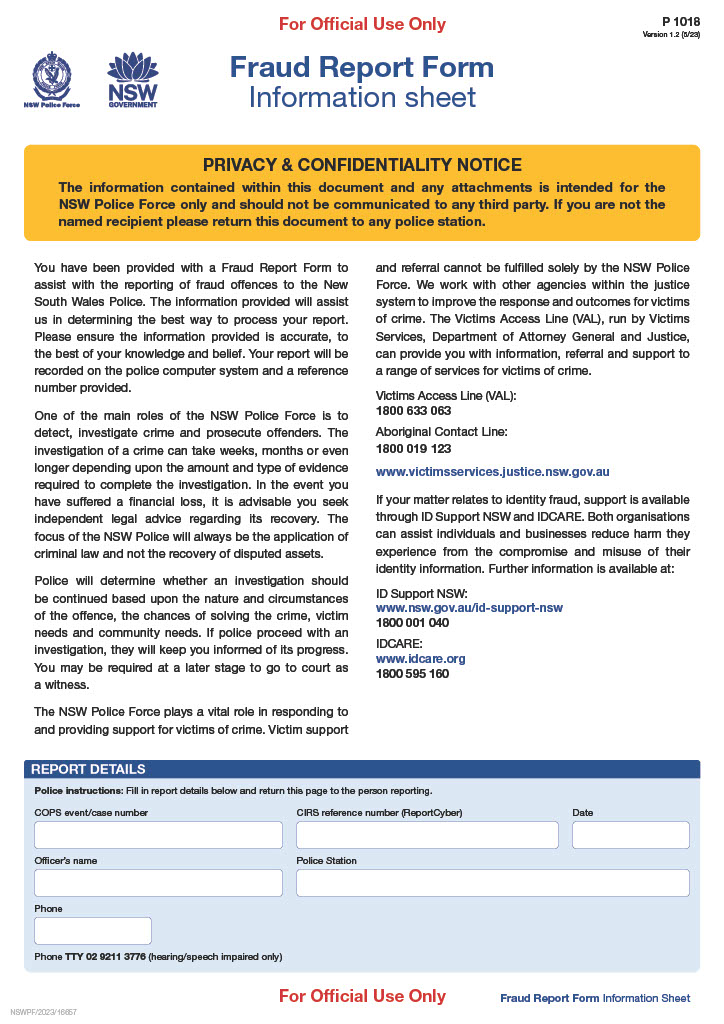What is Fraud?
Fraud is an ‘act of dishonesty, normally through deception or breach of trust, with the intent to either make a gain or cause a loss of money or other property’¹.
In determining whether a fraud has been committed you need to be able to identify any false statements, deceptive conduct or untrue representations made by the person of interest which caused you to part with your money and/or property.
Frauds can range from romance and investment scams to card skimming and identity theft impacting individuals, businesses and government.
Fraud can lead to significant financial losses along with mental and physical trauma for victims².
¹ Fraud Strategy: Stopping Scams and Protecting the Public, viewed 23/04/2025. https://www.gov.uk/government/publications/fraud-strategy/fraud-strategy-stopping-scams-and-protecting-the-public
² Commonwealth Fraud Prevention Centre, The total impacts of fraud, viewed 01/05/2025. https://www.counterfraud.gov.au/total-impacts-fraud
Report a Fraud
One of the main roles of the NSW Police Force is to detect, investigate crime and prosecute offenders. The investigation of a crime can take weeks, months or even longer depending upon the amount and type of evidence required to complete the investigation.
Police will determine whether an investigation should be continued based upon the nature and circumstances of the offence, the chances of solving the crime, victim needs and community needs. If police proceed with an investigation, they will keep you informed of its progress. You may be required at a later stage to go to court as a witness.
The reporting options available to fraud victims include:
- Attending a police station (in person) with a completed Fraud Report Form
- ReportCyber portal – CIRS online reporting
- NSW Police Assistance Line (131 444)
- NSW Police Force Community Portal (online fail to pay goods & services)
Crimes Stoppers allows members of the public to anonymously report information about crime by calling 1800 333 000 or online.
How to respond to fraud:
- Alert your financial institution and close any unauthorised accounts.
- Contact people you know and let them know about the fraud.
- Change your online passwords and closed any fraudulent or breached online accounts.
- Report the theft of identity credentials to issuing organisation like Service NSW and Services Australia.
Other resources available to victims of fraud:
- National Anti-scam Centre Scamwatch – Provides information to consumers and small businesses about how to recognise, avoid and report scams.
- ASIC – Australian Securities and Investment Commission (Report suspicious business activity)
- ACMA – Australian Communications and Media Authority (Report SPAM, unsolicited SMS)
- Reportcyber - Reportcyber, Australian Cyber Security Centre
- APRA – Australian Prudential Regulation Authority
- AFP - Australian Federal Police
- AUSTRAC – Australian Transaction Reports and Analysis Centre
- BDM - NSW Registry of Births, Deaths and Marriages (information on reducing identity theft)
Support services and resources
The NSW Police Force plays a vital role in responding to and providing support for victims of crime. Victim support and referral cannot be fulfilled solely by the NSW Police Force. We work with other agencies within the justice system to improve the response and outcomes for victims of crime. The Victims Access Line (VAL), run by Victims Services, Department of Communities and Justice, can provide you with information, referral and support to a range of services for victims of crime.
- Victims Access Line (VAL): 1800 633 063
- Aboriginal Contact Line: 1800 019 123
- www.victimsservices.justice.nsw.gov.au
If your matter relates to identity fraud, support is available through ID Support NSW and IDCARE. Both organisations can assist individuals and businesses reduce harm they experience from the compromise and misuse of their identity information.
If your identity falls into the wrong hands, ID Support can provide advice on how to:
- Restore the security of your identity documents,
- Protect your identity in the future, and
- Access support, including counselling services.
For more information, please access ID Support NSW - https://www.nsw.gov.au/id-support-nsw or call 1800 001 040. ID Support NSW Poster (PDF)
IDCARE is Australia and New Zealand's national identity & cyber support service. IDCARE provides free support to individuals and organisations impacted by identity theft, scams and cybercrime. Visit www.idcare.org or call 1800 595 160 for more information.
Other resources
- Counselling -Talk to your GP and/or local health professional.
- Solicitor/Lawyer - To obtain advice regarding the recovery of your financial loss.
- Service NSW – Mental wellbeing resources (https://www.service.nsw.gov.au/guide/mental-wellbeing-resources)
Fraud Prevention Tips
Frauds are commonplace and target both individuals and businesses. The NSW Police Force has prepared a series of videos and tip sheets to help you protect yourself against various forms of fraud. These are available on our Crime Prevention Tips page.
The National Anti-Scam Centre, Scamwatch, provides information to consumers and small businesses about how to recognise, avoid and report scams. You are encouraged to visit the Scamwatch website for further information - https://www.scamwatch.gov.au/.
Fail to Pay for Fuel
To the Service Station Proprietor
The offence of Fail to Pay (also known as Drive-Offs) is an ongoing concern of the service station industry and wider community. The NSW Police Force has a standardised way that these offences are reported by the service station industry to the police. This will assist the police to identify, investigate and prosecute people who commit this crime. Police attendance at every offence of this type is not necessary.
The process has been updated and incidents where no emergency exists and immediate investigation by a police officer is not necessary, can now to be made online via the NSW Police Force Community Portal.
The Process
Access the NSW Police Force Community Portal. You will be asked to provide a valid email address and your details, after selecting the Fraud report, to get started.
I want to report > Fraud
In order to determine what type of fraud you wish to report online, you, as the service station representative, will need to complete a short questionnaire with yes, no or picklist responses.
Your answers will help direct you to the appropriate online form to complete or will refer you to the appropriate service to report the fraud.
There are caveats on what can be reported online through the NSW Police Force Community Portal. We’ve implemented a triage process at the beginning of each report, so you can be assured your report can be submitted using the portal. You will be asked the following:
Fail to Pay Triage
Do you reside in NSW or did the fail to pay incident occur in NSW?
(No / Yes)
If you select No you will receive the following message:
Please note when submitting this report you are only making a record with the NSW Police Force.
You should also consider making a report with Police in the State/Territory/Country where you or your business are located, or the location of where the goods or service were not paid for.
Alternatively, you can make a report of fraud related to cybercrime via the Australian Government, Australian Cyber Issue Reporting System (CIRS)
If you select Yes you will be asked:
What type of goods or service was not paid for?
(Select – Fuel from the picklist)
Did any occupant of the vehicle (driver or passenger) enter the shop?
(No / Yes)
If you select Yes you will receive the following message:
This incident cannot be reported online, please call Police Assistance Line on 131 444, or attend your local Police station.
If you select No you will be asked:
Did any vehicle occupant attempt to pay for the fuel or leave property as security for payment?
(No / Yes)
If you select Yes you will receive the following message:
This incident cannot be reported online, please call Police Assistance Line on 131 444, or attend your local Police station.
If you select No you will be asked: CONTINUE
The report will have to be completed to the best of your ability and ideally it would be best if it was completed by the actual witness of the offence. All information sought by Police in the form is critical to any investigation and everything that is recorded is taken into account. The ‘Save as Draft’ feature is located after each section of the report as you work your way through. It is important that the report of the matter is made at the earliest opportunity to maximise the chance of Police being able to identify the person who failed to pay for the fuel product. You will then be directed to complete an online form which asks you to record all the same information that would have been obtained by PoliceLink via the previously used Fail to Pay: Fuel Reporting Form.
The Community Portal provides the ability to upload a wide range of multimedia footage of offenders rather than needing to bring it to a Police Station.
Only when all the required fields have been completed can you submit the report. At that moment you are instantly provided a Community Portal Reference Number. This interim number can be used for insurance claims, or when speaking to police. PoliceLink review each submission and can accept, refuse or seek clarification from you, the service station representative.
Communication with you is an important priority to NSW Police Force. We’ve created our own messaging built right into every report (turned on by default). Once your report is accepted you will receive an official Event number via Email and/or SMS.
If you have selected 'Reporting - Option 2' (electing to have the matter investigated), the report will be assessed at the local police station and Police will make contact about the investigation process. When the investigation commences an officer will contact you to make a time when you will be asked to come to the station to supply a formal statement.
This site also has a number of helpful hints to assist the service station industry to protect itself from fraud and other associated crime.

